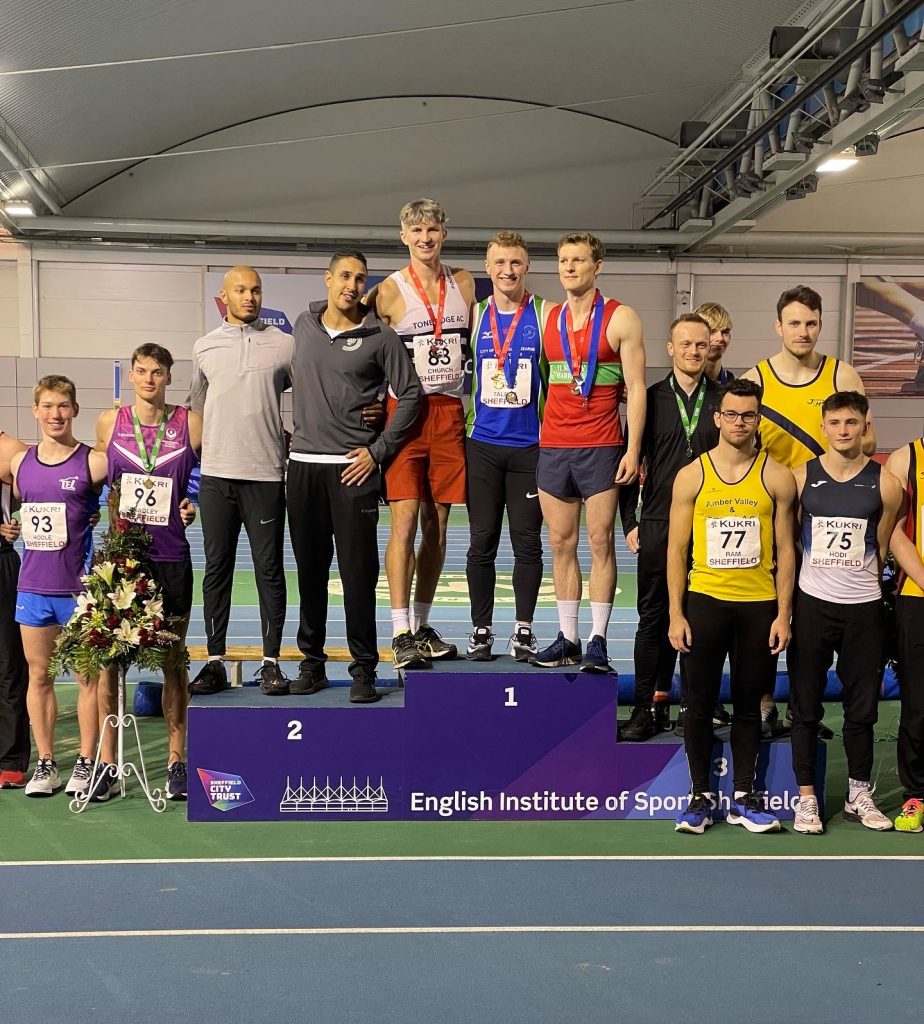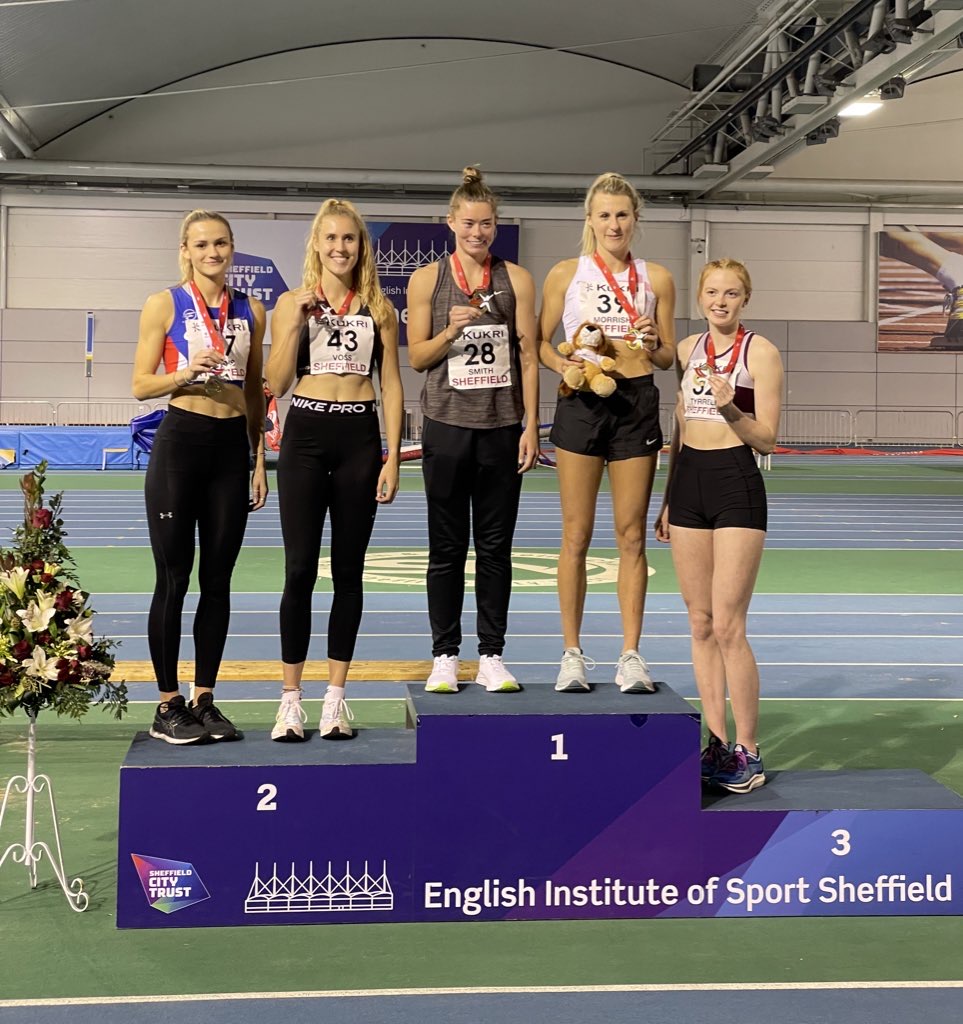In Azusa, California in April 2022, Sam Talbot quietly improved his decathlon best by 600 points to score 7643. He followed that with 7692 points a few weeks later in Bedford. The breakthrough was significant, but it was somewhat overshadowed by Harry Kendall’s score of 7843, also in Bedford, and Lewis Church’s 7773 on the World Athletics Combined Events stop in Grosseto.
In recent years the English champs – and the British champs when the combined eventers have been afforded that courtesy – have been dominated by the likes of Church, Kendall, Elliot Thompson, Andrew Murphy and Harry Maslen.
Talbot had never competed at the English indoor championships, far less place on the podium.
Although he is 23, Talbot’s last heptathlon was as a junior, and due to injury his individual indoor marks have been gathering some dust. But given his proximity to 7700 points outdoors in 2022, Talbot’s heptathlon at the England Combined Events championships in Sheffield last weekend would clearly be much more than the sum of those rusty parts.
The 60m delivered a rush of PBs. Talbot and Adam Hoole both ran under 7 seconds, Talbot for the first time with 6.89s and Hoole in his debut in the senior event with 6.95s. Charlie Roe followed them in 7.12s, while in the second heat Lewis Church improved his lifetime best to 7.34s.
Talbot’s burst in the opening event was tempered in the second, where his furthest jump was just 6.76m, well short of the big 7m plus jumps from earlier in his career (his PB is 7.51m). The most consistent jumper was Harry Maslen, over 7m in each of his three jumps: 7.05m, 7.10m and 7.02m. The best performance was a big improvement from Caius Joseph, 7.23m in the first round, an 11cm PB.
Church was not far off his best, just under 7m, but while the first two events are typically among Talbot’s strongest, Church’s strengths lie elsewhere in his portfolio. So, Talbot’s modest 6.76m suggested that the pendulum would swing firmly back in favour of the strong vertical jumpers – and specifically Church – with two sets of jumps to come in the remaining four events.
After two events Joseph moved into the lead (1706) ahead of Hoole (1688) and Talbot (1679) while Church moved from 14th to sixth.
Come the shot, however, and Talbot recovered his game. In the first of his three throws he matched his 13.96m PB, came close again in the second with 13.91m, and finally throwing over 14m – the only man to do so – with 14.26m. He moved back into the lead (2423) while Church’s throw of 13.85m moved him up another place into fifth.
The high jump was the domain of the big jumpers Church and Liam Reveley, and the field thinned out between 1.83m and 1.89m, Talbot clearing a best of 1.89m. Maslen and Oliver Adnitt went onto to clear 1.92m. Church edged Reveley 1.98m to 1.95m, neither of them making it over 2m on this occasion. Church (3066) moved up another three places into second, just 62 points behind Talbot (3128), with Maslen (3022) and Hoole (3017) close behind.
On Day 2, Talbot already had the fastest PB coming into the field, 8.10s ahead of Maslen’s 8.26s. However, he turned that into a Grant Holloway-esque display to go well under 8 seconds for the first time, running 7.85s. Only seven athletes ran faster in a heptathlon in 2022 – Damian Warner, Abdel Larrinaga, Simon Ehammer, Finley Gaio, Garrett Scantling, Felipe Dos Santos, and Ayden Owens-Delerme.
After five events, Talbot (4148) was 189 points ahead of Church (3959) and Maslen (3935), both of whom – on paper – were significantly better vaulters. Talbot’s historic PB of 4.32m meant that he was seeded into the lower of the two main pole vault groups.
Church started well in the vault, but he peaked at 4.50m. Maslen made it one height further. The star of the event was Ewan Bradley, the only man to clear 4.70m.
Notwithstanding each athlete’s focus on their own performance, knowing what your competitor has achieved in the penultimate event can bring powerful motivation (see N. Kaul, Munich, August 2022). However, the higher vaulters were already finished while Talbot, Hoole and co were still only at 4.10m.
As Group A wrapped up, Talbot quietly racked up height after height in Group B; 4.30m, 4.40m which surpassed his previous best of 4.32m, and then 4.50m which equalled Church’s best of the day. He then cleared 4.60m, matching Maslen’s performance. Of course, since his rivals’ pool was finished, they had no opportunity to respond.
In an event which damage limitation would have been a good outcome for Talbot, with the expectation that Church and Maslen would chip away at his points advantage, he had instead held his lead over the chasing duo and given himself a comfortable 200-point – some 20 seconds – buffer in the 1000m.
Church always delivers a spirited final event, and he pushed Talbot to a PB of 2:38.94s, knocking several seconds off his own best with 2:40.53s.
Talbot’s debut final score was 5823 points, the best mark by a British athlete since Tim Duckworth’s 6156 to win European silver in Glasgow in 2019. Church also added almost 100 points to his lifetime best in second with 5587, and Maslen’s 5559 exceeded his 2019 5506 NCAA mark (on an oversized track).
Beyond the podium, other athletes also made significant progress.
Caius Joseph improved his overall score by 80 points, with PBs in his long jump, hurdles, vault and 1000m. Liam Reveley finally cracked 13m for the shot, and Scotland’s Adam Hoole did brilliantly to maintain second or third position all the way through his first senior championships to the pole vault, a technical event on which he will only improve with experience. Elliot Thompson’s NM in the pole vault unfortunately ended his competition, and he was unable to build on his strong start to the indoor season in December.

In the U20 heptathlon, World U20 Championships representative Sammy Ball led from start to finish to score 5434. In contrast, the U20 pentathlon was open until the last event, when Bryony Bovell’s superior 800m allowed her to overtake Lucy Fellows and win 3727 points to 3707.
Meanwhile, the senior pentathlon competition had multiple layers packed into five events. The four-way competition between Germany’s Laura Voss, USA’s Kaitlin Smith, England’s Jordanna Morrish and Wales’ Lauren Evans was a close one, and only 102 points covered first to fourth place.
Despite a heroic 2:16 solo 800m run, Laura Voss finished just 2 points short of 4000 points, and 18 points behind the overall winner Kaitlin Smith who scored 4016.
Jordanna Morrish’s efforts in the 800m rewarded her with a PB of 2:19.53. That was 42 points more than Lauren Evans’ 2:22.66, giving Morrish an overall pentathlon best of 3966. That in turn positioned her 49 points ahead of Evans and gave her the English title, and third place overall.
But the competition also left us with a cliff-hanger.
Nikki Manson finished the competition with a debut score of 3813 points. One might assume that 1000 points of that came from her high jump, since she is of course a 1.90m+ jumper and the Scottish record holder indoors. In fact, Manson retired at 1.69m as a precaution against a niggle she was experiencing, scoring just 842 from the event. Instead, alongside her 9.13s hurdles, 10.96m shot and 2:34 800m, Manson jumped over 6m (6.04m) in the long jump, the only athlete to do so, and surpassing her previous best by 30cm.
With at least another 150 points in reserve just from her high jump, it can only be a matter of time before Manson surpasses 4000 points.
The full results can be found here.
By Gabby Pieraccini


